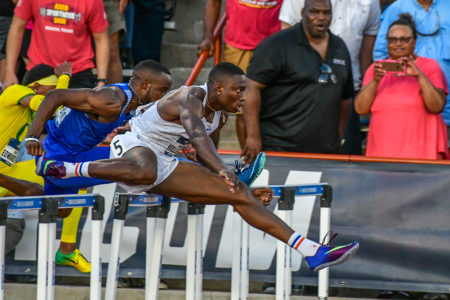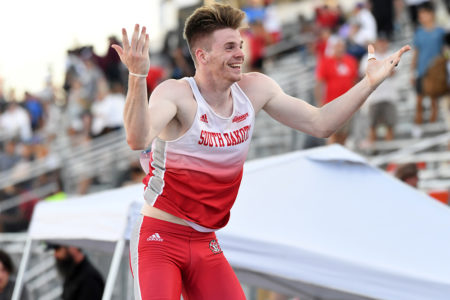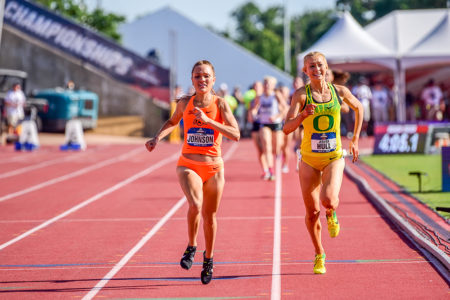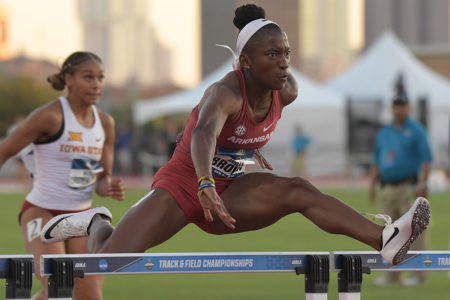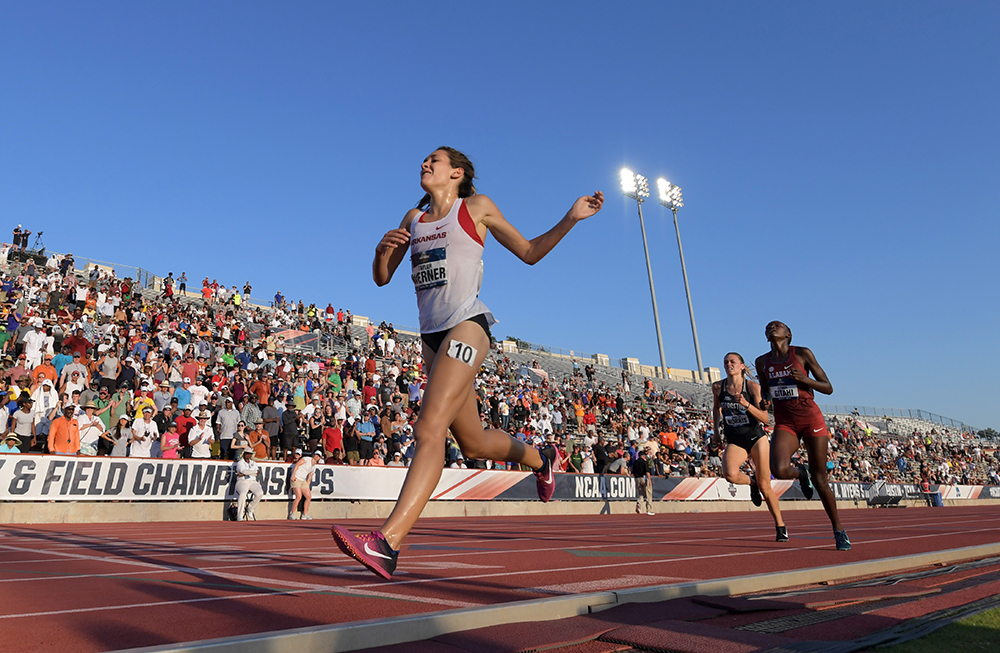
AN NCAA notebook from an incredible 4 days of track & field in Austin:
Both winning teams were led by coaches who cut their teeth at the Div. II level: Texas Tech’s Wes Kittley at Abilene Christian, Arkansas’s Lance Harter at Cal Poly/SLO. In guiding the Tech men to the team title, Kittley fulfilled a lifelong ambition, explaining, “I’ve always wanted to be a coach. I can’t remember a time when I didn’t. I got lucky there, because a lot of people don’t know what they want to do at 50, and I always knew what I wanted to do since I was young.”
Texas A&M swept the men’s and women’s 4 x 400 relays, only the sixth time this has occurred in the 38 years since the women joined the meet. A&M is the first team to accomplish the feat twice, having earlier succeeded in ’11.
Steeple champion Allie Ostrander spoke out against what she said were statements by the ESPN commentators: “I was disappointed with the commentary that has occurred during my races for the past two years. Both times, the comments have brought attention to my appearance more than my ability. In 2018, I was called “the baby-faced assassin” and told that I looked like I still played with Barbies. This year, the commentators found it necessary to state (incorrectly I might add) my height and weight multiple times. Not only were these comments objectifying and unnecessary, they drew attention away from the real focus of the event. People attend this event and listen to the commentary because they want to see what we are capable of, not what we look like we’re capable of. So why do the commentators insist on providing information that has nothing to do with performance in the sport? In a sport where eating disorders and body dysmorphia are so common, the media has an opportunity to help women (and men!) feel capable, powerful, and worthy, but by focusing on appearance and body proportions, this opportunity is missed.” ESPN clarified that the statements in question, at least this year, were made by a stadium announcer.
The men’s 1500, with Yared Nuguse and Justine Kiprotich given the same times in 1st and 2nd, was the first same-time finish since ’44, when Michigan’s Hume twins, Ross and Robert, intentionally tied in a 4:16.6 mile. A modern photofinish camera would probably have given the Humes different 100ths, of course.
Memphis State’s Davon Demoss PRed at 10.05 in his semi but that only earned him the honor of being the fastest non-qualifier in meet history.
Prior to the jump double by LSU’s JuVaughn Harrison, the last notable HJ/LJ attempt came from Richard Duncan of Texas in ’96. He won the long jump and placed 6th in the high jump.
Bryce Hoppel was not finished after winning his second NCAA 800 title for the year. Said the Kansas junior, “Getting ready for USA’s and hopefully making the World team. That’s definitely the next goal.”
Florida throws coach Steve Lemke deserves props. Only two hammer throwers PRed in the men’s hammer, and both were his: Thomas Mardal (4th) and AJ McFarland (6th).
It took a while for her 100 hurdle win to hit Arkansas’s Janeek Brown. “It took me probably 48 hours to say, ‘Wow. I’m the national recordholder. I’m the fastest person in Jamaica to do hurdles probably ever.’”
Virginia’s Jordan Scott had been favored to win the triple jump, but ended up with a loss on the final attempt. He said, “I think it was a good showing,” adding, “Overall it was a really bad technical day. I had a lot of jumps behind the board. I had to do a lot of adjusting so it’s just back to the drawing board.”
Derek Miles, coach of men’s vault champion Chris Nilsen, said the focus now is on making the team for Doha. “To peak almost two times at a very high level is very difficult to do. I think we’ll play with the schedule a little bit, we’ll work at some training things to see if we can get his body to continue to fire here. Maybe the next thing is 6m [19-8¼] or the American Record at 6.06 [19-10½].”
Watching the video of his fall on the final barrier in his steeple win, Stanford’s Steven Fahy said, “It kind of makes me cringe. I’ve watched the video a bunch of times. I think that the adrenaline really took over and I didn’t really feel the pain of falling and then hitting the rail right away.
“When you’re in a situation like that, I think in your mind you perceive it as you hit the ground and immediately bounce back up and run. And it wasn’t until I watched the video later that I saw just how long it took me to really get up and reorient myself and get back up to speed.”
It had been a long climb back for North Carolina’s Madison Wiltrout, who finished 3rd in the women’s javelin. Her career—which featured her setting the national HS record as a soph in ’15, went off the tracks 4 years ago with a bad injury followed by surgery. “I think this was my breakthrough season, I had a few years of trouble with the injuries and I wasn’t able to be what I wanted to be. I let go of the past and showed that I’m on a new journey.”
Curtis Frye said he wasn’t in a hurry to recruit his NCAA 400 champ, Wadeline Jonathas, from Div. III UMass Boston. “Wadeline kind of fell into our hands. She called twice and I didn’t take the call the first few times because I’m not interested in raiding kids getting opportunities to get an education. So I didn’t accept the call, I didn’t try to recruit her away from her DIII school, but when it kept happening, to me, it was meant to be.”
UCLA’s Alyssa Wilson scored in all three of her throws. The Bruin soph said, “That’s been one of my goals ever since coming to UCLA. I’ve always wanted to prove to myself and others that I can excel in all events that I compete in.”
After his double runner-up finish in the sprints, Oregon’s Cravon Gillespie signed with Nike. “All the hard work is paying off,” he said. “A lot of times you want to quit and give up, but when you get in shape and have a meet like this, having fun in front of the crowd, you know it’s all worth it.”
Houston head Leroy Burrell said that balance will be the key to the Cougars becoming a perennial contender: “We’ve got some more things that we need to do in this program. I think right now we’re too reliant in the sprints. We’ve got to spread it out and get a few more events covered in the distances and the field. We have younger athletes who can help us get there in the field. We need that to happen.”
BYU distance runners did well in Austin. Said coach Ed Eyestone about preparing for nationals, “We’ve not been blessed with many warm days this spring. Our guys have been wearing multiple layers and long-sleeve shirts during workouts. Guys have spent some quality time in the sauna as well. The bottom line is to get as fit as you can. The fitter guys are generally going to do better in the tough conditions.”
Texas Tech’s Duke Kicinski captured the NCAA discus, but realized he will have to step it up to contend for a spot on the Olympic team, saying, “I’ve got to get a lot better. I’ll spend the next year getting better, improving my technique and getting stronger. Every year, I get better.”
Alabama head Dan Waters was thrilled with Portious Warren getting 2nd in the shot. “Portious has had just a tremendous senior year,” he said. “She just kept working at it and getting better and better each meet. To have her go out with a huge series of throws like that was great to see. To get edged by such a small margin on one of the last throws of the meet. It’s tough, but I couldn’t be prouder of her and the way she handled it and the way she attacked her final event as a collegian.” ◻︎

